-
Elevating Dental Care: Introducing Fluoride Varnish to Our Standard of Care for Adult Patients
Introduction: At Your Smile Bel Air Family Dentistry, we are committed to providing our adult patients with outstanding dental care that goes beyond expectations. We are excited to announce the formal inclusion of fluoride varnish* as a core component of our standard of care. In this blog post, we will introduce fluoride varnish, highlight its advantages over other fluoride treatments, and emphasize its low risk of ingestion and convenience for our valued adult patients.
Understanding Fluoride Varnish: Fluoride varnish is a highly effective preventive treatment that offers targeted protection against tooth decay and enamel erosion. It is a concentrated gel-like substance that contains a higher concentration of fluoride compared to other fluoride treatments. Here’s why we have chosen to incorporate fluoride varnish into our standard of care for adults:
1. Enhanced Protection: The application of fluoride varnish forms a durable coating on the teeth, acting as a physical barrier against acid attacks and enamel demineralization. This protective layer significantly reduces the risk of tooth decay and helps maintain strong, healthy teeth.
2. Low Risk of Ingestion: We understand the concerns surrounding fluoride ingestion, especially for adult patients. With fluoride varnish, the risk of ingestion is minimal due to its fast-drying nature. The varnish adheres to the teeth quickly, minimizing the chances of swallowing any significant amount.
3. Convenience for Adult Patients: Fluoride varnish offers unparalleled convenience, making it an ideal choice for our adult patients. The application process is simple and non-invasive, taking only a few minutes during your regular dental visit. Unlike other treatments, there’s no need to wait for any specific amount of time before eating or drinking. You can resume your daily activities immediately after the application.The Benefits of Fluoride Varnish for Adults: By including fluoride varnish with our routine dental cleanings, we are prioritizing the oral health and well-being of our adult patients. Here are the key benefits you can expect:
1. Reduced Risk of Tooth Decay: Fluoride varnish provides a concentrated and long-lasting fluoride release that effectively strengthens tooth enamel and helps prevent cavities.
2. Protection against Enamel Erosion: The protective barrier created by fluoride varnish shields the teeth from acid attacks, reducing the risk of enamel erosion and maintaining a healthy smile.
3. Alleviation of Tooth Sensitivity: Fluoride varnish can help alleviate tooth sensitivity by sealing exposed dentin and reducing discomfort.
4. Tailored Treatment for High-Risk Individuals: For adults with a higher risk of tooth decay or specific oral health conditions, fluoride varnish can be applied directly to targeted areas that require additional protection, such as areas showing early signs of decay or exposed root surfaces.Conclusion: With the addition of fluoride varnish to our standard of care, we are excited to offer our adult patients an enhanced level of protection against tooth decay and enamel erosion. Fluoride varnish is a safe, convenient, and highly effective preventive treatment that minimizes the risk of ingestion while delivering targeted benefits. Experience the difference of our comprehensive dental care by scheduling your next appointment today.
*While adult fluoride varnish has been established as a standard of care at our dental office, it is important to note that coverage for this treatment may vary among dental insurance plans. We recommend patients to contact their dental insurance provider for detailed information regarding coverage, benefits, and any associated costs. Please be aware that any fees related to fluoride varnish treatment are the responsibility of the patient. Our team is available to assist you in addressing any queries or concerns you may have regarding insurance coverage.
-
Let’s Take Prevention to the Next Level
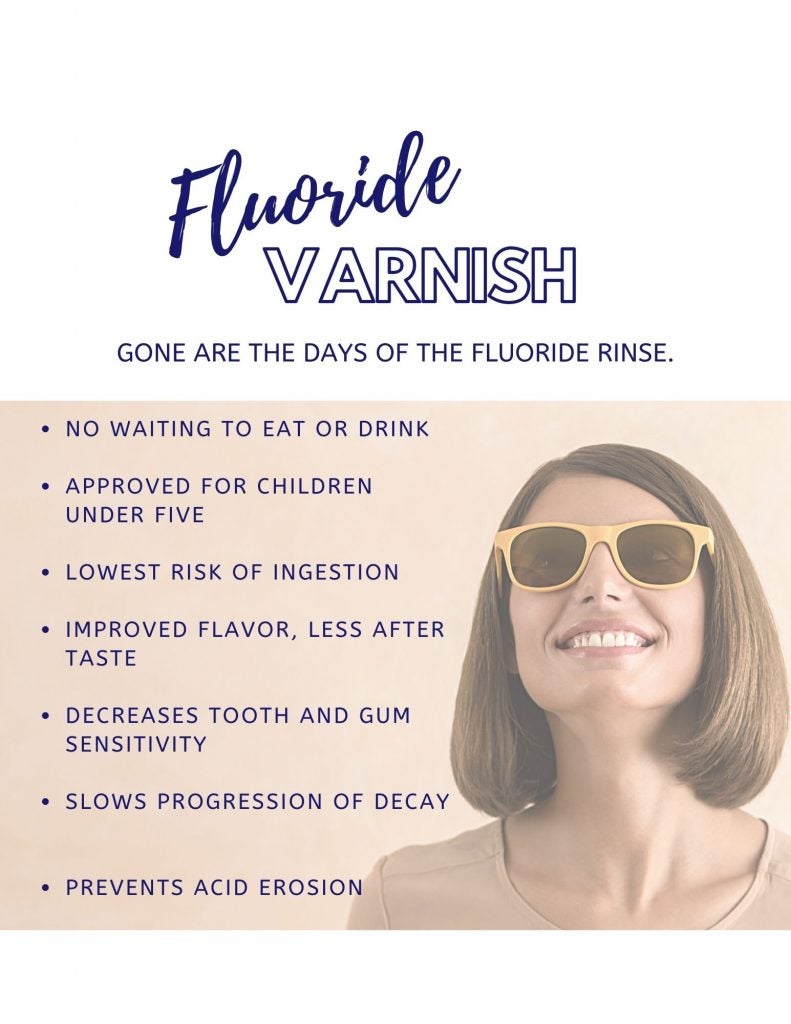
-
Could Sugarless Drinks Hurt Your Teeth?
You are probably aware of the problems that sugar can cause for your teeth and gums, but switching to sugarless drinks might not be the final answer for good dental care. Remember that you should be visiting your Dr. Zhu for regular appointments as well as practicing proper dental care at home. Check out this video clip to find out if sugarless drinks could be hurting your teeth.
It is not uncommon to see advertisements for sugarless drinks that claim to be healthier than their competitors. However, switching to these sugarless drinks might not be the best idea for your dental care. Sodas, sports drinks, and other sugarless beverages might still contain acids that can attack your tooth enamel and cause decay; despite the way these drinks are advertised, this is not very friendly towards your teeth. Be sure to read the labels carefully and practice proper dental hygiene daily.
-
Answering Your Questions About Teeth Whitening
Everyone wants a bright and beautiful smile, so it’s no surprise that professional whitening is one of the most commonly performed procedures in cosmetic dentistry. If you’re thinking about seeing a dentist for tooth whitening in Bel Air, MD , then continue reading to learn the answers to common questions about this treatment.
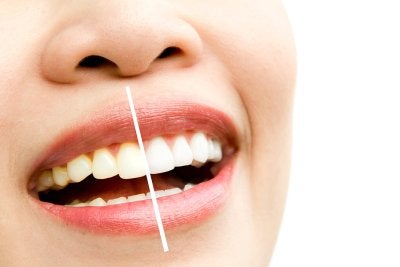
Why is professional whitening better than other options?
The greatest benefit that you’ll gain by seeing a dentist for tooth whitening is speed. Unlike over-the-counter kits, professional whitening uses a stronger formula that can provide you with a noticeably whiter smile in a single treatment. At-home kits that you can pick up at the drugstore often take a week or longer to provide noticeable results.
What happens during teeth whitening?
When you visit your dental office for professional tooth whitening, your dentist will have you wear a tray during the treatment that will cover your teeth with a specially formulated whitening gel. Also, your dentist may use a type of light to enhance the whitening effects of the gel. These appointments typically take about an hour.
How long will my results last?
The answer to this question depends on a number of factors. How well your teeth take to the treatment and how much enamel they have can affect how long your results last. Also, your oral hygiene practices, dietary choices, and lifestyle habits can influence how long your tooth whitening results remain noticeable.
How can I make my results last longer?
Luckily, there are a number of steps that you can take to help retain your tooth whitening results. First, avoid eating or drinking any items that can stain your teeth, such as coffee, tea, soda, berries, and anything tomato-based. If you do choose to eat and drink these items, be sure to rinse your mouth or brush your teeth afterward. Finally, keeping up with twice-daily tooth brushing and biannual dental cleanings can help prevent stains from building up on your teeth.
-
Identifying the Essentials of Good Oral Hygiene
If you’re like most people, then you dislike hearing that you have a dental cavity when you visit your dental office in Bel Air, MD for a check-up. Luckily, preventing the need for tooth fillings and other restorative procedures can be as simple as practicing good oral hygiene.
At home, dental care begins with keeping your teeth clean. To do this, use a toothbrush that has soft or medium-strength bristles, and switch to a new toothbrush once every 3 months. Brush your teeth twice per day for a full 2 minutes using a fluoride-containing toothpaste. Also, floss your teeth at least once per day, ideally before bed, to help dislodge any food that may be stuck between your teeth.
In addition to keeping up with brushing and flossing, scheduling regular dentist visits is also an important part of dental care. See your dentist twice per year for check-ups and cleanings to help keep your teeth free of stains and tartar and to catch small problems before they have a chance to grow into bigger ones.
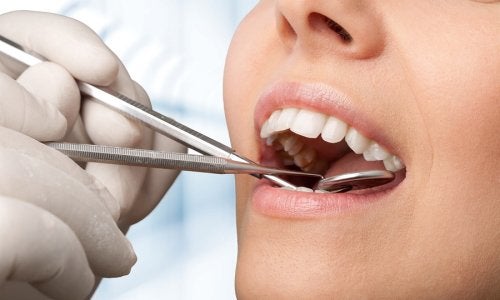
-
How Diabetes Can Affect Your Oral Health
Diabetes is a medical condition that can affect all of the major systems of the body. If you have diabetes, you may be surprised to learn that your oral health can also be affected by this disease. Fortunately, with services and care from a general dentistry office in Bel Air , you will be able to make sure that your teeth and gums remain healthy and strong. Your dental office can assist you with tooth filling, general cleanings, and a variety of other important dental care services. To help you care for your teeth, here is a look at how diabetes can affect your oral health.

Gum Disease
People with diabetes are more likely to develop gum disease than non-diabetics. Gum disease occurs in stages, and can be reversed if it is detected early. The beginning stage of gum disease is known as gingivitis. As gum disease progresses, puffy, red gums may start to bleed and recede. Advanced gum disease may result in tooth loss, abscesses, and other very serious issues.
Tooth Loss
Diabetic patients may also find that they are at increased risk of experiencing tooth loss. There are many reasons why a person may lose a tooth in adulthood. A tooth may need to be extracted if it is severely decayed or infected. Problems with the gum surrounding the tooth may also result in tooth loss. Fortunately, cosmetic dentistry procedures can be used to fill in the space left by a missing tooth and restore a patient’s smile.
Dry Mouth
Dry mouth is another oral health problem that is associated with diabetes. When a patient has a frequently dry mouth, he or she may develop ulcers, sores, and frequent cavities. Dry mouth is also a very uncomfortable condition. With services from a dentist in your area, you can prevent and treat any of the oral health issues that are associated with diabetes. Your dentist can keep your smile healthy and brilliant throughout your lifetime.
-
Are Sports Drinks Safe for Your Smile?
Sports drinks might seem like a healthy choice, perhaps because they are marketed toward fitness enthusiasts. However, pediatric dentists in Bel Air, MD, warn parents that sports drinks can actually be just as harmful for teeth as soda. They can increase the risk of dental cavities, which require tooth fillings to correct. One way that sports drinks are harmful for teeth is the amount of sugar. The bacteria in the mouth thrive in sugary environments. As the bacteria feast on sugar, they produce acids as a byproduct. These acids wear away the enamel on the teeth and create dental cavities.
Some sports drinks might seem to be healthier for teeth because they are sugar-free. But in fact, even sugar-free drinks can wear away as much enamel as sugary beverages can. This is because these beverages tend to contain phosphoric acid, citric acid, and tartaric acid. The acidic nature of these beverages has a corrosive effect on the teeth. Instead of sports drinks, pediatric dentists recommend drinking milk or water.

-
What Happens During a Root Canal?
If you experience tooth pain and visit an emergency dentist near Bel Air, MD, it’s possible that your dentist will determine that the nerve of your tooth has been damaged by an infection or decay. In these situations, a root canal is indicated. A root canal can save your natural tooth and prevent the need for a tooth extraction. To perform this common dental procedure, your dentist will thoroughly numb the area and create an access opening on the top of the affected tooth. Then, the dentist inserts a series of root canal files into the opening to remove the infected pulp and other damaged tissues. Other dental instruments may be needed to address tooth decay, if this problem is also present.
Once all of the damaged material has been removed from the tooth, the dentist seals the hole with a temporary or permanent filling. In the same office visit, we will permanently seal the tooth if you received a temporary filling. Your dentist will also permanently affix a dental crown on top of the tooth. The dental crown looks just like a natural tooth; it protects the natural tooth from trauma.
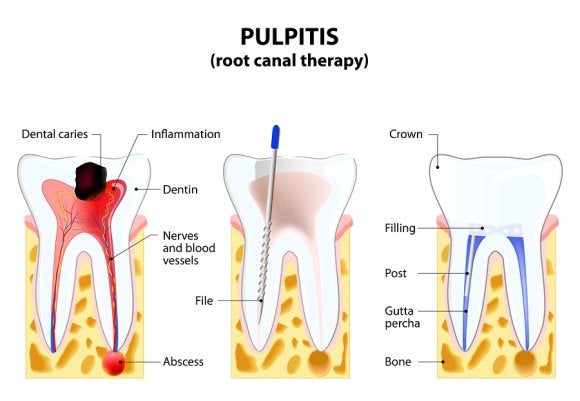
-
Are Dental Implants Right for You?
Your dentist may recommend that you get dental implants near Bel Air, MD if you have undergone a tooth extraction, have a severely chipped tooth, or are missing one or more teeth. Dental implants are a safe, effective cosmetic dentistry alternative to dentures and dental bridges. Here is a look at some of the reasons that you may want to discuss dental implants with your dentist.
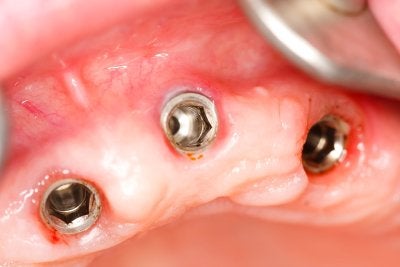
You are missing one or more teeth.
Your dentist can replace one or more missing teeth via a relatively simple cosmetic dentistry procedure using dental implants. A dental implant is a prosthetic tooth that is attached to a titanium rod that is implanted directly into your jawbone. The prosthetic tooth can be customized to match the size, shape, and color of your remaining natural teeth. This means that it looks almost unnoticeable when you talk and smile.
You are looking for an alternative to dentures or a dental bridge
Dentures and dental bridges are other cosmetic dentistry options that can be used to repair a chipped tooth or replace missing teeth. If you are missing all of your teeth, your dentist will recommend that you receive dentures. However, if you are only missing one or two teeth, dental implants are a better cosmetic dentistry solution. Because dental implants are anchored to the jawbone, they prevent many dental problems associated with missing teeth. Dental implants will ensure that you don’t suffer from jawbone loss, shifting teeth, or facial deformity. Dentures are not anchored to the jawbone, and thus do not prevent these problems.
You are in good physical health and committed to future dental care.
Your dentist will determine if you are a good candidate for dental implants. To be a good candidate, you must be committed to maintaining your future dental care. You will need to brush, floss, and use mouthwash at home. You must also visit your dental clinic at least every six months for dental cleanings and exams. You may not be a good candidate for dental implants if you have severe bone loss or advanced gum disease, smoke regularly, or have certain existing medical conditions.
-
Steps to Take in Preventing Gum Disease
Gum disease, also known as periodontal disease, is one of the leading causes of tooth loss in adults. Initially, periodontal disease in Bel Air can be difficult to detect until it has advanced. In the early stages of gum disease , usually referred to as gingivitis, most people may not notice any signs at all. This is why it is so important to regularly visit a dentist to monitor signs of gum disease. Luckily, gum disease is easy to prevent. Since it is caused by bacteria, it is simply a
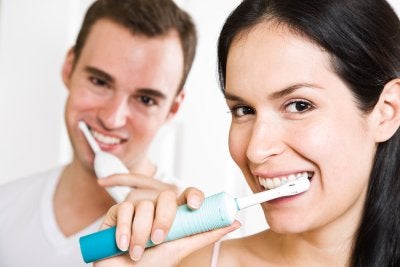 matter of reducing the amount of bacteria in your mouth. Keep reading for tips on gum disease prevention.
matter of reducing the amount of bacteria in your mouth. Keep reading for tips on gum disease prevention. Routinely Brush and Floss
A dental hygiene routine is key to preventing gum disease. At a minimum, you should brush your teeth twice a day and floss teeth once a day. For the best results, brush and floss after each meal. This will help eliminate food particles that can get stuck in between teeth and cause bacteria to grow. It is important to use a toothbrush with different lengths of bristles to ensure that all surface area of each tooth is reached. Using toothpaste with fluoride helps protect your mouth from gum disease. When flossing, be sure to get in between each tooth, especially the back molars. In addition to brushing and flossing, a mouthwash can help rinse away pieces of food and also freshen your breath.Regularly Visit the Dentist
No oral health care routine is complete without annual visits to the dentist. Most dentists recommend regular visits every six months. During a dental exam, a dental hygienist will perform a teeth cleaning that is able to remove plaque and tartar that you cannot clean off at home. Once plaque hardens, it forms tartar, which can lead to gum disease. Regular dental cleanings help prevent tartar buildup. A dentist will likely take x-rays to detect any abnormalities in your mouth. By regularly visiting your dentist, you can also notify them of any new pain or other problems. Early detection of problems can prevent major problems down the road and also help you avoid the need to see an emergency dentist.
RECENT POSTS
categories
- Uncategorized
- General Dentistry
- Toothache
- Emergency Dentistry
- Family Dentistry
- Receding Gums
- Cosmetic Dentistry
- Veneers
- Gum Disease
- Gingivitis
- Dental Crowns
- Orthodontics
- Dental Implants
- Root Canal
- Wisdom Teeth
- Teeth Whitening
- Your Smile
- Composite Fillings
- Lumineers
- Dentures
- Invisalign
- BrightSmile
- Dental Bridge
- Abscessed Tooth
- Sealants
